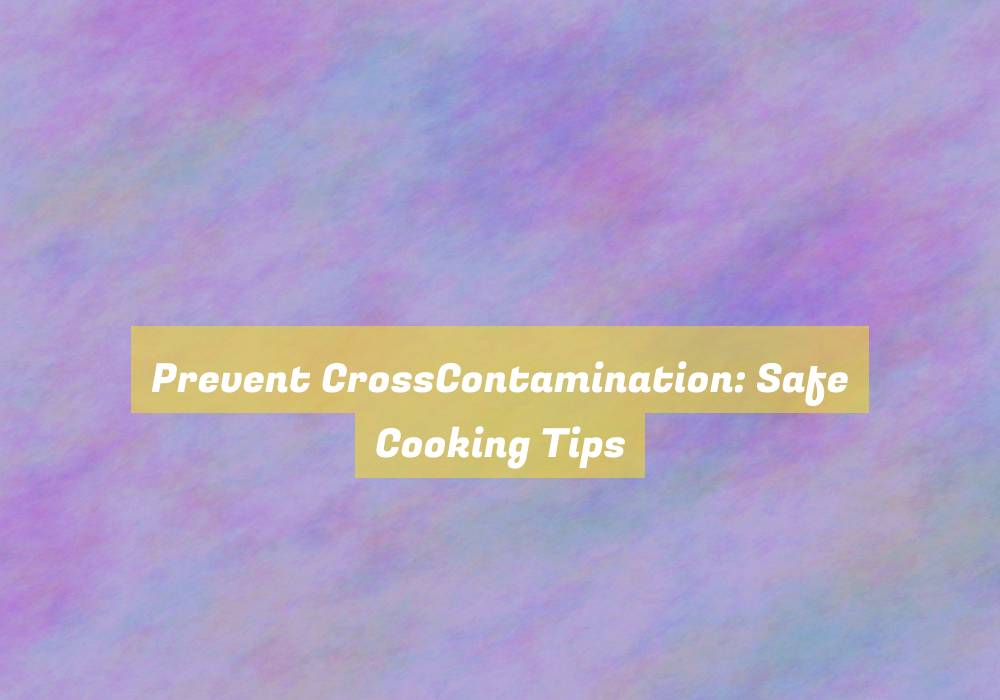Prevent CrossContamination: Safe Cooking Tips
When it comes to keeping your kitchen safe and your meals delicious, there are a few key practices that can make a significant difference in the outcome of your cooking.
You may not realize it, but there are simple steps you can take to ensure that your food remains free from harmful bacteria and potential contaminants. By implementing a few precautionary measures, you can greatly reduce the risk of foodborne illnesses and create a healthier environment for you and your loved ones.
Just a few adjustments to your cooking routine can go a long way in maintaining the safety and quality of your meals.
Importance of Food Separation
To prevent cross-contamination and foodborne illnesses, always separate raw meats from other food items in your kitchen. Cross-contamination can occur when juices from raw meats come into contact with ready-to-eat foods, leading to harmful bacteria spreading and potentially causing foodborne illnesses.
ItG??s crucial to use separate cutting boards and utensils for raw meats, especially when preparing meals. This simple practice significantly reduces the risk of bacteria transferring to other foods that wonG??t undergo further cooking.
Additionally, store raw meats in a designated area in the refrigerator, ideally on the bottom shelf, to prevent any drips or leaks onto other food items. When grocery shopping, place raw meats in separate bags to avoid any potential leaks onto fresh produce or other items.
Proper Handling of Raw Meats
Practice safe food handling by always keeping raw meats separate from other food items in your kitchen. This means using separate cutting boards, utensils, and containers for raw meats to avoid cross-contamination.
When marinating meats, do so in the refrigerator and not on the counter to prevent bacteria growth. Store raw meats in leak-proof containers or sealed plastic bags to prevent any juices from dripping onto other foods in the refrigerator.
ItG??s important to wash your hands with warm water and soap before and after handling raw meats to avoid spreading bacteria. Additionally, surfaces that come into contact with raw meats should be cleaned and sanitized thoroughly.
When transporting raw meats from the grocery store, use a separate bag to prevent any leaks or drips from contaminating other food items.
Effective Cleaning and Sanitizing
When cleaning and sanitizing surfaces that have come into contact with raw meats, ensure thorough cleansing to prevent cross-contamination and the spread of harmful bacteria. Use hot, soapy water to wash all utensils, cutting boards, and countertops that have been in contact with raw meats.
Additionally, consider using separate cutting boardsG??one for raw meats and another for fresh produceG??to minimize the risk of cross-contamination.
After washing, sanitize the surfaces with a solution of one tablespoon of unscented, liquid chlorine bleach per gallon of water. Allow the sanitizing solution to sit on the surfaces for at least one minute before rinsing with clean water and air-drying.
ItG??s also important to regularly clean and sanitize kitchen towels, sponges, and any other tools or surfaces that may have come into contact with raw meats.
Safe Storage Practices
Consider organizing your refrigerator to ensure proper storage of perishable foods and prevent cross-contamination.
- Store raw meat, poultry, and seafood in containers or sealed plastic bags on the bottom shelf to prevent their juices from dripping onto other foods.
- Keep eggs in their original carton and store them on a shelf, rather than in the door where the temperature fluctuates.
- Use airtight containers to store leftovers and ensure theyG??re labeled with the date to track freshness.
- When storing raw produce, keep it separate from ready-to-eat foods to avoid potential contamination.
- Use the G??first in, first outG?? rule to ensure older items are used before newer ones.
- Additionally, regularly clean your refrigerator, paying close attention to spills and leaks.
- When storing canned goods, arrange them with the oldest cans at the front for easy use and to prevent them from being forgotten and expiring.
Conclusion
So remember, keeping your food separated, handling raw meats properly, and effectively cleaning and sanitizing are key to preventing cross-contamination in the kitchen.
Safe storage practices also play a crucial role in keeping your food safe to eat.
By following these tips, you can ensure that your meals arenG??t only delicious but also safe for you and your loved ones to enjoy.
Stay safe and happy cooking!







